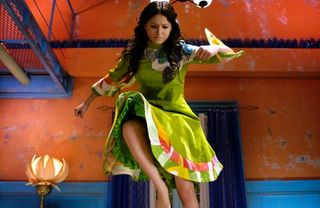Survive Style 5+
This film is 120 minutes of sheer madcap lunacy. It's like going to a bar and having a long, involved conversation with a really entertaining coke fiend. You're having some drinks and listneing to his wild stories, and it's only after an hour or two that you realize nothing he's said has made any sense, or links up in any way. You'd be hard-pressed to recall the exact substance of the talk later, but you're pretty sure you enjoyed yourself.
That's the experience of watching Gen Sekiguchi's ensemble comedy. It's befuddling, and hard to summarize thoughtfully, but so imaginitive, daring and enthralling, I'm pretty sure I liked it at the time.
Like the British films of Guy Ritchie (from whom Sekiguchi borrows footballer-turned-actor Vinnie Jones), Survive Style 5+ bounces around between several different stories that intersect in unexpected ways. Everything revolves in some way around one murder - an unnamed man (Tadanobu Asano) kills his wife and buries her in the forest.
When he arrives home, the man is surprised to discover his wife waiting for him at the dining room table. She wordlessly prepares him a huge meal, before kicking his ass using supernatural powers. After killing her a few more times, only to have her reappear even more violent and powerful than before, the man turns to a foreign hitman (Jones) and his strange interpreter.
This hitman, meanwhile, has also been hired by a quirky advertising executive (Yoshiyoshi Arakawa) to kill her cruel hypnotist boyfriend. Regrettably, the hypnotist is murdered only moments after convincing a straight-laced family man (Ittoku Kishibe) that he is a bird.
I realize, in describing the film, that it sounds really stupid. In a way, it is really stupid. In tone, the film kind of reminds me of David O. Russell's brilliant I Heart Huckabees. Serious issues of identity, memory and fate creep around the edges of a loony slapstick farce. And though Huckabees has more depth and gets more out of its ensemble cast, I dare say Survive Style has an even grander visual sense and a more fanciful, playful sensibility.
Dream logic abounds. I think part of the idea Sekiguchi means to get at (though there's really no telling the specific intent of a movie as outlandish as this one) is the notion of change, and how quickly humans can adapt to new circumstances. All the bizarre goings-on in this film (and the situations get increasingly bizarre and impossible) are treated casually, like everyday events. Everyone in the film is nonplussed, even when their husbands turn into birds or their dead wives continually return from the grave, detaching their forearms and using them as projectiles.
And this loose sort of mutability is reflected in every aspect of the film's style. The colors are bright and jarring, and environments frequently clash with the action going on before them. Sekiguchi abandons sequence midway through to leap to the next topic, and often interrupts the main action for a fantasy sequence or an odd musical cue. And the soundtrack is an eclectic mix of Japanese and American techno, rock and hip-hop.
As I said, I'm not sure if the film really adds up to much. For around 90 minutes, it seems content to serve as a hallucinatory screwball comedy, but the final sequences make me think Sekiguchi may have much more in mind. I'd have to watch the film a few more times to be sure exactly what he's getting at, if that is, he's after anything more than making a gleeful, spastic mindfuck of a movie.

No comments:
Post a Comment